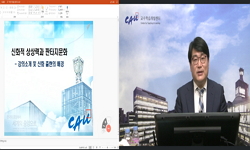Jang Joon-Hawn’s Save the Green Planet defies an easy categorization in its generic hybridity and comic character building. Stretched unevenly along the bricolage of typical B-movie milieu, the self-claimed, plebian hero, lost in immitigable trauma ...
http://chineseinput.net/에서 pinyin(병음)방식으로 중국어를 변환할 수 있습니다.
변환된 중국어를 복사하여 사용하시면 됩니다.
- 中文 을 입력하시려면 zhongwen을 입력하시고 space를누르시면됩니다.
- 北京 을 입력하시려면 beijing을 입력하시고 space를 누르시면 됩니다.
부가정보
다국어 초록 (Multilingual Abstract)
Jang Joon-Hawn’s Save the Green Planet defies an easy categorization in its generic hybridity and comic character building. Stretched unevenly along the bricolage of typical B-movie milieu, the self-claimed, plebian hero, lost in immitigable trauma and vengeful madness, does not complete his savior mission. Unlike other technically empowered superheroes of the just cause, he even fails to earn the moral sympathy from the audience. Yet he dies a hero of our own time in that he, as a victim of galactic conspiracy and his own paranoid fantasy, clairvoyantly anticipates and partly impairs the monstrous conglomerate of capitalism and political corruption. Generically overturning the repressive political measures of 1980s into their cinematic opposites, the kidnapper-torturer-schemer at once problematizes the logic of infinite justice and befuddles our sense of reality. No sooner Byung-Gu’s monomaniacal revenge became pointless than the victimized industrial magnet turned out to be a real alien with the greater monstrosity. Ironically, fantasy returns as a repressed trauma precisely when the movie actualizes the imagined catastrophe. Diegetic flashbacks about Byung-Gu’s schizophrenia and CEO Kang’s imaginary ufology retroactively obtain a political significance in terms of the desire of the Other. The kidnapper and the victim mirror each other and share the same futile desire that depends on the grand catastrophic scenario controlled all along by the omnipotent Big Brother. Byung-Gu is made a superhero of our time not by his tragic sacrifice but by his very traumatic madness. Neither a winner of infinite justice nor an anti-heroic moral victor, Byung-Gu ironically represents the birth of the hero of the third kind: a ghost. A ghostly hero born in the ashes of the catastrophe, Byung-Gu will haunt us the citizen of globalization as an ineffable signifier of absent, absolute otherness. Save the Green Planet records the last heroic resistance of the traumatic madness in the face of the impending doom of global annihilation.
참고문헌 (Reference)
1 정봉석, "현실과 환상을 가로지르는 오브제의 작용 -<지구를 지켜라>(장준환 각본·감독, 2003)*-" 한국드라마학회 (31) : 279-303, 2009
2 Woonsung Yu, "Why We Praise Save the Green Planet"
3 Kim, Kyung Hyun, "Virtual Hallyu: Korean Cinema of the Global Era" Duke UP 2011
4 Pilkington, Mark, "The Tartan Guide to Asian Extreme" Starflux Limited 2004
5 Freud, Sigmund, "The Standard Edition of the Complete Psychological Works of Sigmund Freud. Vol. 21" Hogarth 57-146, 1961
6 Freud, Sigmund, "The Standard Edition of the Complete Psychological Works of Sigmund Freud. Vol. 21" Hogarth 1-56, 1961
7 Freud, Sigmund, "The Standard Edition of the Complete Psychological Works of Sigmund Freud. Vol. 14" Hogarth 243-258, 1957
8 Utin, Pablo, "Sliding through Genres: The Slippery Structure in South Korean Films" 8 (8): 45-58, 2006
9 Workman, Travis, "Simultaneous Worlds: Global Science Fiction Cinema" U of Minnesota P 257-271, 2015
10 Rayns, Tony, "Shock Tactics: Save the Green Planet" 15 (15): 84-, 2005
1 정봉석, "현실과 환상을 가로지르는 오브제의 작용 -<지구를 지켜라>(장준환 각본·감독, 2003)*-" 한국드라마학회 (31) : 279-303, 2009
2 Woonsung Yu, "Why We Praise Save the Green Planet"
3 Kim, Kyung Hyun, "Virtual Hallyu: Korean Cinema of the Global Era" Duke UP 2011
4 Pilkington, Mark, "The Tartan Guide to Asian Extreme" Starflux Limited 2004
5 Freud, Sigmund, "The Standard Edition of the Complete Psychological Works of Sigmund Freud. Vol. 21" Hogarth 57-146, 1961
6 Freud, Sigmund, "The Standard Edition of the Complete Psychological Works of Sigmund Freud. Vol. 21" Hogarth 1-56, 1961
7 Freud, Sigmund, "The Standard Edition of the Complete Psychological Works of Sigmund Freud. Vol. 14" Hogarth 243-258, 1957
8 Utin, Pablo, "Sliding through Genres: The Slippery Structure in South Korean Films" 8 (8): 45-58, 2006
9 Workman, Travis, "Simultaneous Worlds: Global Science Fiction Cinema" U of Minnesota P 257-271, 2015
10 Rayns, Tony, "Shock Tactics: Save the Green Planet" 15 (15): 84-, 2005
11 Kumar, Arun, "Save the Green Planet: An Elegy for the ‘Violent Gene’ in Us"
12 "Save the Green Planet. Dir. Jang Joon-hwan"
13 Lynn, Hyung Gu, "Powering the Ignorant Eye: Aesthetic Value and Korean Film" 7 (7): 22-25, 2004
14 Zinn, Howard, "Mission Unaccomplished" Nation Books 1-13, 2006
15 Stephens, Chuck, "Local Heroes: The Many Faces of Korean Cinema’s Perpetual Renaissance" 40 (40): 36-, 2004
16 An, Jinsoo, "Introduction" 7 (7): 1-9, 2015
17 Dargis, Manohla, "In a Beanie and on a Mission"
18 Paik, Peter Y., "From Utopia to Apocalypse: Science Fiction and the Politics of Catastrophe" U of Minnesota P 2010
19 Martin-Jones, David, "Decompressing Modernity: South Korea Time Travel Narratives and the IMF Crisis" 46 : 45-67, 2007
20 Chang, Kyung-Sup, "Compressed Modernity and Its Discontents: South Korean Society in Transition" 28 (28): 30-55, 1999
21 Martin, Daniel, "Categorizing Cult: The Reputation and Reception of Save the Green Planet!" 22 (22): 138-149, 2011
22 Hoberman, J., "Battlefield Earth"
동일학술지(권/호) 다른 논문
-
<기아계층의 저주>와 <사랑의 바보짓>에 나타난 미국 가족과 남성
- 문학과영상학회
- 유호전
- 2017
- KCI등재
-
포스트페미니즘 시대 미국 교외지역의 초상: <위기의 주부들>
- 문학과영상학회
- 이형식
- 2017
- KCI등재
-
On the Deconstruction of the Any-suburbia-whatever
- 문학과영상학회
- Joff P. N. BRADLEY
- 2017
- KCI등재
-
경계인: 한국 미디어 속 조선족 형상 연구 —영화 <황해>와 <청년경찰>을 중심으로—
- 문학과영상학회
- 송원찬
- 2017
- KCI등재
분석정보
인용정보 인용지수 설명보기
학술지 이력
| 연월일 | 이력구분 | 이력상세 | 등재구분 |
|---|---|---|---|
| 2026 | 평가예정 | 재인증평가 신청대상 (재인증) | |
| 2020-01-01 | 평가 | 등재학술지 유지 (재인증) |  |
| 2019-08-06 | 학회명변경 | 영문명 : Korean Association Of Literature And Film -> The Korean Association Of Literature and Film |  |
| 2017-01-01 | 평가 | 등재학술지 유지 (계속평가) |  |
| 2013-01-01 | 평가 | 등재학술지 유지 (등재유지) |  |
| 2010-01-01 | 평가 | 등재학술지 유지 (등재유지) |  |
| 2008-01-01 | 평가 | 등재학술지 유지 (등재유지) |  |
| 2005-01-01 | 평가 | 등재학술지 선정 (등재후보2차) |  |
| 2004-01-01 | 평가 | 등재후보 1차 PASS (등재후보1차) |  |
| 2003-01-01 | 평가 | 등재후보학술지 선정 (신규평가) |  |
학술지 인용정보
| 기준연도 | WOS-KCI 통합IF(2년) | KCIF(2년) | KCIF(3년) |
|---|---|---|---|
| 2016 | 0.17 | 0.17 | 0.2 |
| KCIF(4년) | KCIF(5년) | 중심성지수(3년) | 즉시성지수 |
| 0.23 | 0.26 | 0.491 | 0.04 |





 KISS
KISS






